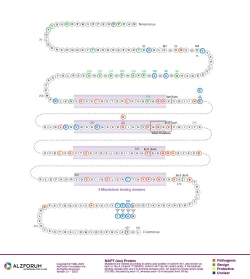Mutations
MAPT G213R
Quick Links
Overview
Pathogenicity: Frontotemporal Dementia : Benign, Alzheimer's Disease : Unclear Pathogenicity
Clinical
Phenotype: Alzheimer's Disease
Reference Assembly: GRCh37/hg19
Position: Chr17:44060807 G>A
dbSNP ID: rs76375268
Coding/Non-Coding: Coding
DNA
Change: Substitution
Expected RNA
Consequence: Substitution
Expected Protein
Consequence: Missense
Codon
Change: GGG to AGG
Reference
Isoform: Tau Isoform Tau-G (776 aa)
Genomic
Region: Exon 4a
Findings
This variant was reported in a study of individuals of Spanish descent (Jin et al., 2012). It was detected in one out of 176 cases with Alzheimer's disease and absent in 139 controls. The mutation carrier was described as having sporadic early onset AD, with onset at age 64.5. Further clinical details were not reported.
This variant was also detected in an exome-sequencing study of Caucasian individuals. It was found in two of 141 cases with late-onset AD and in one out of 179 controls without neuropathology. In the two individuals with AD, symptom onset occurred at 74 and 75 years of age. Further clinical details were not available. APOE genotypes were ε3/ε4 and ε3/ε3 (Sassi et al., 2014).
Note that this variant occurs in an exon excluded from most tau transcripts and it is therefore not represented in most isoforms. However, it is present in longer isoforms such as PNS-tau (P10636-1) and Tau-G (P10636-9), which are 758 and 776 amino acids long, respectively. Therefore, the position of this variant is in reference to these isoforms, rather than to isoform Tau-F (P10636-8), which is conventionally used for naming mutations in tau.
Neuropathology
Not applicable.
Biological Effect
Unknown. In silico, this variant is predicted to be “possibly damaging.” It is classified as a benign polymorphism according to the algorithm proposed by Guerreiro et al., 2010 (Sassi et al., 2014).
Last Updated: 16 Feb 2023
References
Paper Citations
- Jin SC, Pastor P, Cooper B, Cervantes S, Benitez BA, Razquin C, Goate A, Ibero-American Alzheimer Disease Genetics Group Researchers, Cruchaga C. Pooled-DNA sequencing identifies novel causative variants in PSEN1, GRN and MAPT in a clinical early-onset and familial Alzheimer's disease Ibero-American cohort. Alzheimers Res Ther. 2012 Aug 20;4(4):34. PubMed.
- Sassi C, Guerreiro R, Gibbs R, Ding J, Lupton MK, Troakes C, Al-Sarraj S, Niblock M, Gallo JM, Adnan J, Killick R, Brown KS, Medway C, Lord J, Turton J, Bras J, Alzheimer's Research UK Consortium, Morgan K, Powell JF, Singleton A, Hardy J. Investigating the role of rare coding variability in Mendelian dementia genes (APP, PSEN1, PSEN2, GRN, MAPT, and PRNP) in late-onset Alzheimer's disease. Neurobiol Aging. 2014 Dec;35(12):2881.e1-2881.e6. Epub 2014 Jun 16 PubMed.
- Guerreiro RJ, Baquero M, Blesa R, Boada M, Brás JM, Bullido MJ, Calado A, Crook R, Ferreira C, Frank A, Gómez-Isla T, Hernández I, Lleó A, Machado A, Martínez-Lage P, Masdeu J, Molina-Porcel L, Molinuevo JL, Pastor P, Pérez-Tur J, Relvas R, Oliveira CR, Ribeiro MH, Rogaeva E, Sa A, Samaranch L, Sánchez-Valle R, Santana I, Tàrraga L, Valdivieso F, Singleton A, Hardy J, Clarimón J. Genetic screening of Alzheimer's disease genes in Iberian and African samples yields novel mutations in presenilins and APP. Neurobiol Aging. 2010 May;31(5):725-31. Epub 2008 Jul 30 PubMed.
External Citations
Further Reading
No Available Further Reading
Protein Diagram
Primary Papers
- Jin SC, Pastor P, Cooper B, Cervantes S, Benitez BA, Razquin C, Goate A, Ibero-American Alzheimer Disease Genetics Group Researchers, Cruchaga C. Pooled-DNA sequencing identifies novel causative variants in PSEN1, GRN and MAPT in a clinical early-onset and familial Alzheimer's disease Ibero-American cohort. Alzheimers Res Ther. 2012 Aug 20;4(4):34. PubMed.
Alzpedia
Disclaimer: Alzforum does not provide medical advice. The Content is for informational, educational, research and reference purposes only and is not intended to substitute for professional medical advice, diagnosis or treatment. Always seek advice from a qualified physician or health care professional about any medical concern, and do not disregard professional medical advice because of anything you may read on Alzforum.


Comments
No Available Comments
Make a Comment
To make a comment you must login or register.